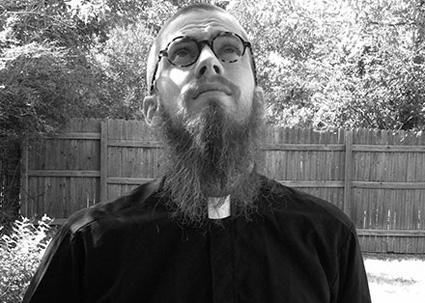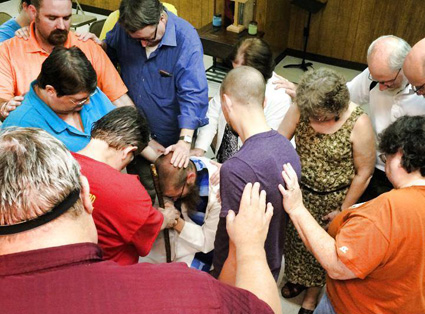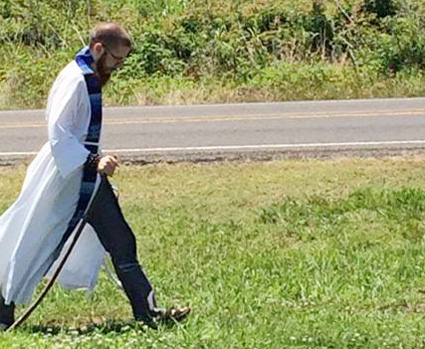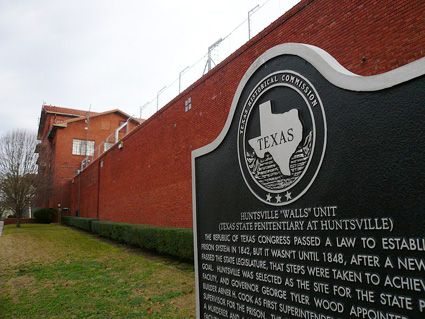Minister walks 200 miles to focus on the death penalty
Jeff Hood walked 200 miles from Livingston to Austin in the Texas heat to call attention to more than 500 people the state has executed in the last 38 years and to pray for an end to capital punishment.
 Jeff Hood—a minister with Baptist roots—began his trek at the Polunksy Unit, where he prayed with several men on death row. By the time he reached his final destination, bandages covered his feet, and he suffered from at least 15 blisters. (Image: Center for Theological Activism Facebook Page)Hood—a minister with Baptist roots—began his trek at the Polunksy Unit, where he prayed with several men on death row. As he walked outside the warden’s office window, some of the personnel came outside. One of them asked what he was doing.
Jeff Hood—a minister with Baptist roots—began his trek at the Polunksy Unit, where he prayed with several men on death row. By the time he reached his final destination, bandages covered his feet, and he suffered from at least 15 blisters. (Image: Center for Theological Activism Facebook Page)Hood—a minister with Baptist roots—began his trek at the Polunksy Unit, where he prayed with several men on death row. As he walked outside the warden’s office window, some of the personnel came outside. One of them asked what he was doing.
Hood explained he was on a pilgrimage to end the death penalty. When asked why, he simply replied: “I’m a Christian. I don’t believe you can love your neighbor as yourself and execute him.”
The man responded, “I never thought of that.”
Hood’s journey took him from the Polunksy Unit near Livingston to Huntsville, where the state performs executions. From there, he walked to Bryan/College Station and then on to the steps of the Texas Capitol in Austin. By the time he reached his final destination, bandages covered his feet, and he suffered from at least 15 blisters.
Speaking from the Capitol steps, he called on people of faith to take a stand against the death penalty as a spiritual discipline.
“It’s important to realize, particularly here in Texas, if the death penalty is to be overturned, it will be people of faith who do it,” he said.
 Supporters pray for Jeff Hood at a stop about 76 miles into his walk to Austin. (Image: Center for Theological Activism Facebook Page)“Jesus attended two executions in his life. One he stopped. The other was his.”
Supporters pray for Jeff Hood at a stop about 76 miles into his walk to Austin. (Image: Center for Theological Activism Facebook Page)“Jesus attended two executions in his life. One he stopped. The other was his.”
Hood held what he called “faithful conversations” at churches of several denominations along the way, ending at University Baptist Church in Austin.
Hood—who grew up Southern Baptist and graduated from Southern Baptist Theological Seminary—attracted plenty of attention along the way. With his long beard, clerical stole and robe, onlookers found him hard to miss.
“A lot of folks down here have never seen anything like this,” he said.
Outside Livingston, a woman offered to give him a ride. When he explained the purpose behind his walk, he said, the woman told him: “I didn’t know Christians ever did things like that anymore. … I didn’t know Christians really cared.”
 Jeff Hood made his 200-mile pilgrimage to pray for an end to the death penalty.At one point, Hood stopped to rest, and a man approached him and began asking him hostile questions.
Jeff Hood made his 200-mile pilgrimage to pray for an end to the death penalty.At one point, Hood stopped to rest, and a man approached him and began asking him hostile questions.
Hood explained he was making a pilgrimage to pray for an end to the death penalty.
“I told him I was praying we could find a way to love each other and stop killing—to put an end to the cycle of violence,” he said.
The man’s demeanor changed, and he acknowledged he had approached him in anger because he didn’t understand him.
“He told me: ‘I don’t agree with your position on the death penalty, but I agree we have to find a way to love each other. And I guess if we find a way, there won’t be any need for the death penalty,’” Hood said, recounting the conversation.
The discussions his pilgrimage prompted offered multiple opportunities to explain why his faith in Jesus compelled him to take a stand against state-sanctioned killing, he noted.
 The Huntsville Unit (or “Walls” Unit) of the Texas Department of Criminal Justice houses the State of Texas execution chamber. (Wikipedia Image)He insisted his 200-mile trek felt like “a very Baptist thing to do,” since Baptists grew out of the Radical Reformation. “It’s just me being a Baptist.”
The Huntsville Unit (or “Walls” Unit) of the Texas Department of Criminal Justice houses the State of Texas execution chamber. (Wikipedia Image)He insisted his 200-mile trek felt like “a very Baptist thing to do,” since Baptists grew out of the Radical Reformation. “It’s just me being a Baptist.”
Hood, pastor of a house church in Denton, serves on the board of directors of the Texas Coalition to Abolish the Death Penalty and on the national council of the Fellowship of Reconciliation.
“I feel passionately about a lot of issues, but I haven’t walked 200 miles for any of them,” he said. “It’s not just about changing public policy. This can change our very souls.
“I see this as a meta-issue that speaks directly to our faith. Are we going to be a people who insist on life and who champion life, or will we be people who insist on death and champion death?”